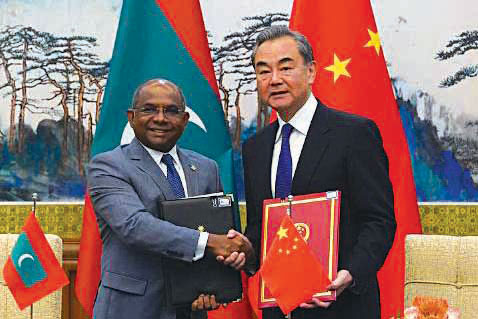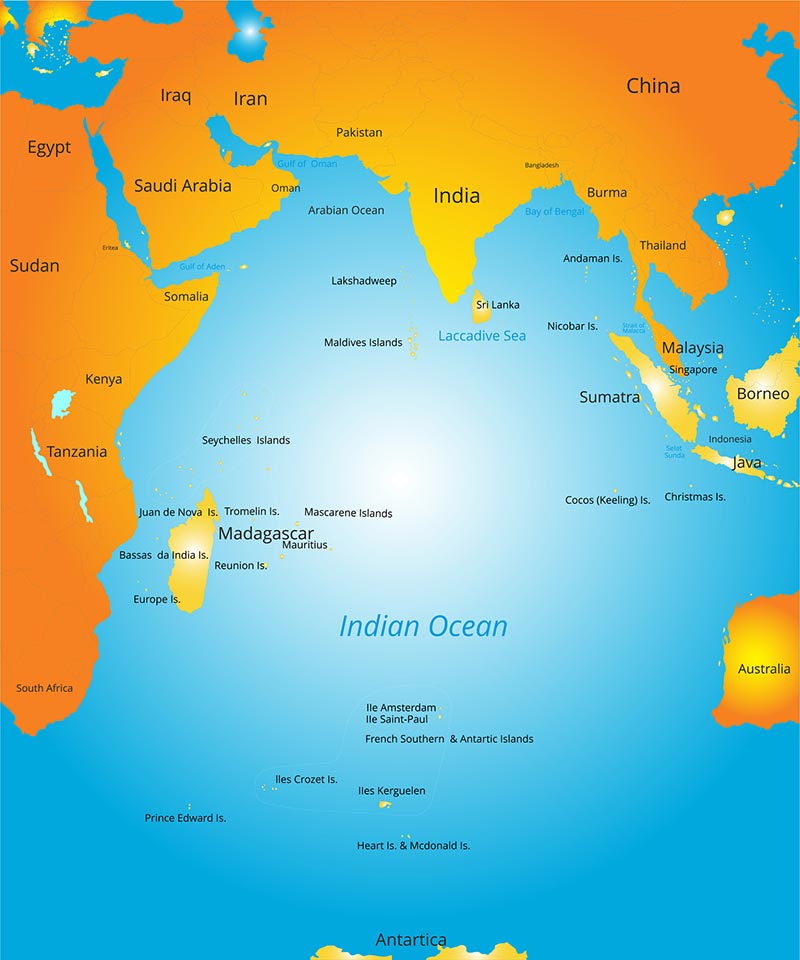China’s Foreign Minister Visits The Maldives: Analysis
Proposal to develop a China-Indian Ocean Forum will rattle New Delhi
China’s Foreign Minister Wang Yi visited the Maldives earlier this month as a follow on from his traditional New Year trip to Africa (report here)
The Maldives are a small, yet strategically important group of islands stretching from the southern tip of India to beyond the equator. Composed of coral reefs, the Maldives are in serious danger of flooding as a consequence of global warming, with plans being made to counter the effects of sea level rises, including the acquisition of land in India for resettlement purposes. Just an hour’s flight from Sri Lanka, the Maldives play an important role in regional tourism and fishing.

China’s Foreign Minister Wang Yi with Abdulla Shahid
Wang met with the Maldivian Foreign Minister Abdulla Shahid and outlined some of the achievements that China has made in the Maldives as part of the Belt & Road Initiative, stating that:
“As a comprehensive friendly partner of cooperation, China supports the Maldives in accelerating its economic and social development and enhancing its capacity for independent development. This is China’s original and consistent aspiration and down-to-earth action in conducting cooperation with the Maldives. We have advanced the renovation and expansion project of the Velana International Airport, while the completion of the China-Maldives Friendship Bridge has solved the Maldivian people’s chronic travel difficulties. So far, the bridge has witnessed more than 100 million travels. We have built more than 10,000 housing units for the Maldivian side and helped tens of thousands of Maldivian families improve their living conditions. Within the G20 framework, we have actively facilitated debt alleviation and suspension for the Maldives, accounting for three-quarters of the Maldives’ international total debt suspension. During this visit, we are also launching a new batch of assistance and cooperation projects with the Maldives to boost the country’s economic revitalization. Facts have proved that the joint construction of the Maritime Silk Road by China and the Maldives serves the common interests of the two peoples.”
The Maldivian economy has taken a battering during Covid as its tourism industry essentially came to a standstill. The tourism sector is the countries largest, and typically accounts for more than 28% of its GDP and 60% of Maldives foreign exchange.
However, in political terms, the Maldives tends to play China and India off each other, and despite China’s investments into the Maldives, it is Indian companies that have generally acquired the larger infrastructure and development projects. However, Wang still has China’s eye on the Maldives telecommunications sector as well as maritime economic development in the fisheries industry.
Five Agreements were signed between China and the Maldives during Wang’s visit, including an “Agreement on Mutual Visa Exemption”, which will allow Maldivians to travel to China on a 30-day visa-free basis, once the pandemic restrictions have been lifted; the “Economic and Technical Cooperation Agreement on Grant Aid, of about US$63 million to be used for social, livelihood, and infrastructure projects as agreed by both parties.; a “Letter of Exchange on the Feasibility Study of Management and Maintenance of China-Maldives Friendship Bridge”; a “Supplementary Contract to the Implementation Contract for China Aided Micro-Grid Sea-water Desalination Project in the Maldives”; and an “Agreement to extend the services of a specialist Ophthalmic Center in the Maldives.”
Wang also requested that the Maldives ratify the 2017 Free Trade Agreement as soon as possible, in order to create favourable conditions for the Maldives’ products and services to enter into the Chinese market. This has been held up due to opposition from India – the Maldives is a member of the SAARC trade bloc and New Delhi wishes to keep the Maldives close. Cheaper Chinese products it is felt would damage the Maldives trade with India, Dubai, and Singapore, and with it diversified regional political and trade influence. Male is unwilling to see that disperse in favour of China.

In terms of produce, in 2019 the Maldives exported just US$30.4 million to China, mainly Petroleum Gas, Integrated Circuits and Semi-Conductors with very little from the lucrative marine sector. China meanwhile exported US$338 million of products, including iron, steel, and aluminum, together with furniture products.
While the Maldives are currently under the political influence of India, the Government is unlikely at this stage to look to abandoning its regional trade and political ties to put all its eggs in one China basket. Yet the Maldives is a democracy, and the opposition party are known to be pro-Beijing. The next elections will be held in 2023 and can be expected to be contentious. How China handles the Maldives given the influence of India will be a key regional aspect – which is one reason that Wang also suggested the creation of a ”China-Indian Ocean Forum” to include all countries of the region – extending to East Africa and into South-East Asia and an agenda to leverage ”the development of Indian Ocean Island countries to build consensus and synergy, and promote common development.”
Related Reading
About Us
Chris Devonshire-Ellis is the Chairman of Dezan Shira & Associates. The firm assists British and Foreign Investment into Asia and has 28 offices throughout China, India, the ASEAN nations and Russia. For strategic and business intelligence concerning China’s Belt & Road Initiative please email silkroad@dezshira.com or visit us at www.dezshira.com





